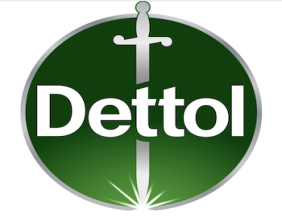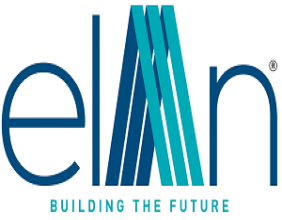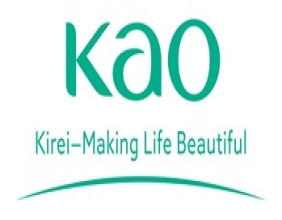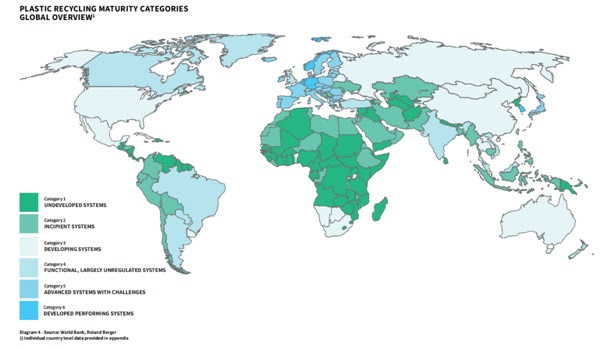A study published by the Alliance to End Plastic Waste and supported by Roland Berger highlights potential pathways to significantly increase waste collection and plastic recycling rates globally. The Plastic Waste Management Framework lays out a framework with policy levers and actions that can be used to develop national action plans for advancing waste management systems and help effect systems change.
In the meta-analysis, 192 countries were classified into six categories of plastic waste management and recycling maturity based on characteristics such as waste management and recycling infrastructure, legislative framework, and operational models, viz:
-
Category 1 (Undeveloped Systems) consists of countries with no or very basic waste management infrastructure with a plastic recycling rate of up to 5 per cent.
-
Category 2 (Incipient Systems) includes countries with basic waste regulations but limited collection and end-of-life treatment infrastructure. These countries have plastic recycling rates of up to 10 per cent.
-
Category 3 (Developing Systems) refers to countries with functional waste management systems. However, collection, sorting, incineration, and recycling are developed only to the extent they are justified by intrinsic economic value, without additional policy levers that drive recycling rates beyond 15 per cent.
-
Category 4 (Functional, Largely Unregulated Systems) comprises countries that have recycling rates approaching 25 per cent motivated by some regulatory pressure. India is classified as a Category 4 country, alongside Argentina, Brazil, Malaysia, Turkey, Vietnam, and more.
-
Category 5 (Advanced Systems with Challenges) encompasses countries that can achieve plastic recycling rates of up to 40 percent, although they may still face challenges in specific segments in the value chain.
-
Category 6 (Developed Performing Systems) is the most advanced. Countries in this group achieve recycling rates of more than 40 per cent and demonstrate global best practice that can serve as beacons for other nations.
| |
Global view of Plastic Recycling Maturity Categories
Through the study, it was found that more than 60 per cent of all countries have underdeveloped or incipient waste systems, recycling less than 8 per cent of plastic waste generated. These Category 1 and 2 countries have the biggest opportunity to end plastic waste leakage into the environment. Typically, the informal "waste picker" sector plays a key role in waste management in these geographies, and should be acknowledged and supported, ensuring their inclusion when planning for the evolution of a country's waste management system (a "just transition"(1)). It was also found that effective policy levers to consider for Category 1 and 2 countries include developing waste management legislation, building institutional capacity, and establishing financial obligations from brand owners and waste generators.
In India, 80 percent of plastic collection relies on the informal sector (2), With an average of over 10,000 waste pickers per city(3). Although India was classified under Category 4, in many regions, its waste management systems have varying levels of dependence on an informal sector of "waste pickers" numbering in the millions. Supported by legislative frameworks established in 2016, some of these waste pickers now have formalised rights, including access to waste, designated sorting spaces, and participation in door-to-door collection.
Social entitlement programs, spearheaded by the Ministry of Social Justice, focus on eradicating manual scavenging, and offer training, credit access, health provisions, and national insurance for waste pickers as well. The collaborative efforts of waste picker organisations, cooperatives, and government bodies further contribute to the sectors integration and advocacy for the rights and needs of waste pickers across India.
The study also highlighted the importance of Extended Producer Responsibility (EPR) as one of the most effective policy instruments for increasing recycling rates overall. Particularly relevant for Category 3, 4, and 5 countries including India, EPR enforces shared responsibility across the plastic value chain including brands and retailers as well as post-use treatment. Money generated from EPR fees are typically directed towards improving waste management and recycling solutions, ideally harmonised across local geographies to maximise effectiveness. As the maturity of waste management in a country improves, mandatory and eventually eco-modulated EPR schemes should replace voluntary commitments.
When EPR systems are implemented, recycling rates for packaging and items like Waste Electrical and Electronic Equipment (WEEE), tires, and batteries can be increased by up to 15-25 percentage points over a 10-15-year period.
More and more countries have effectively implemented EPR systems in last few years. By the end of 2020, more than 40 countries had operational EPR systems, while over 20 additional countries were planning its adoption.
A small number of countries identified in Categories 5 and 6 are the most advanced in the journey towards full plastic circularity and can benefit from laying out policy roadmaps with holistic objectives for the circularity of all waste types. They have the capacity and resources required to drive innovation such as enabling the highly granular sorting and traceability of plastic waste to efficiently supply the recycling economy. In these markets, EPR schemes should incentivise adoption of design-for-circularity principles, for example through eco-modulated fees which stimulate the use of most benign materials and achievement of reuse and recycling targets.
The study stresses the reality that countries have very diverse national and sub-national circumstances and that their waste management systems and technical capabilities are at different levels of development. Proposed policy and infrastructure priorities need to reflect these considerations alongside the availability of resources to deliver systems change.
Jacob Duer, President, and CEO at the Alliance said, "Over the past decade, plastic consumption has steadily increased in tandem with global economic growth. Yet 70 percent of all plastic waste remains uncollected, leaks into the environment, ends up in landfill, or is incinerated. Every nation has the opportunity to improve by setting priorities and developing pragmatic solutions that are appropriate for their current state of maturity in managing waste, guided by the vision of a circular economy."
"The United Nations Environment Assembly's resolution to develop an international legally binding instrument on plastic pollution can be a major contributor to setting these priorities. As the Alliance's waste management maturity framework highlights, there is no one-size-fits-all solution, but there are policy levers available at all levels which will drive rapid progress towards a sustainable transition to plastic circularity."
Dragos Popa, Principal at Roland Berger said, "Despite advancements made to recycling technology, every year, 250 million tonnes of plastic waste remain mismanaged. To support Alliance to End Plastic Waste with the development of the Plastic Waste Management Framework, Roland Berger shared proprietary frameworks, databases, as well as domain-specific knowledge and expertise to synthesise key learnings from the Alliances global network of projects and project partners."
The full Plastic Waste Management Framework is available for download here.






